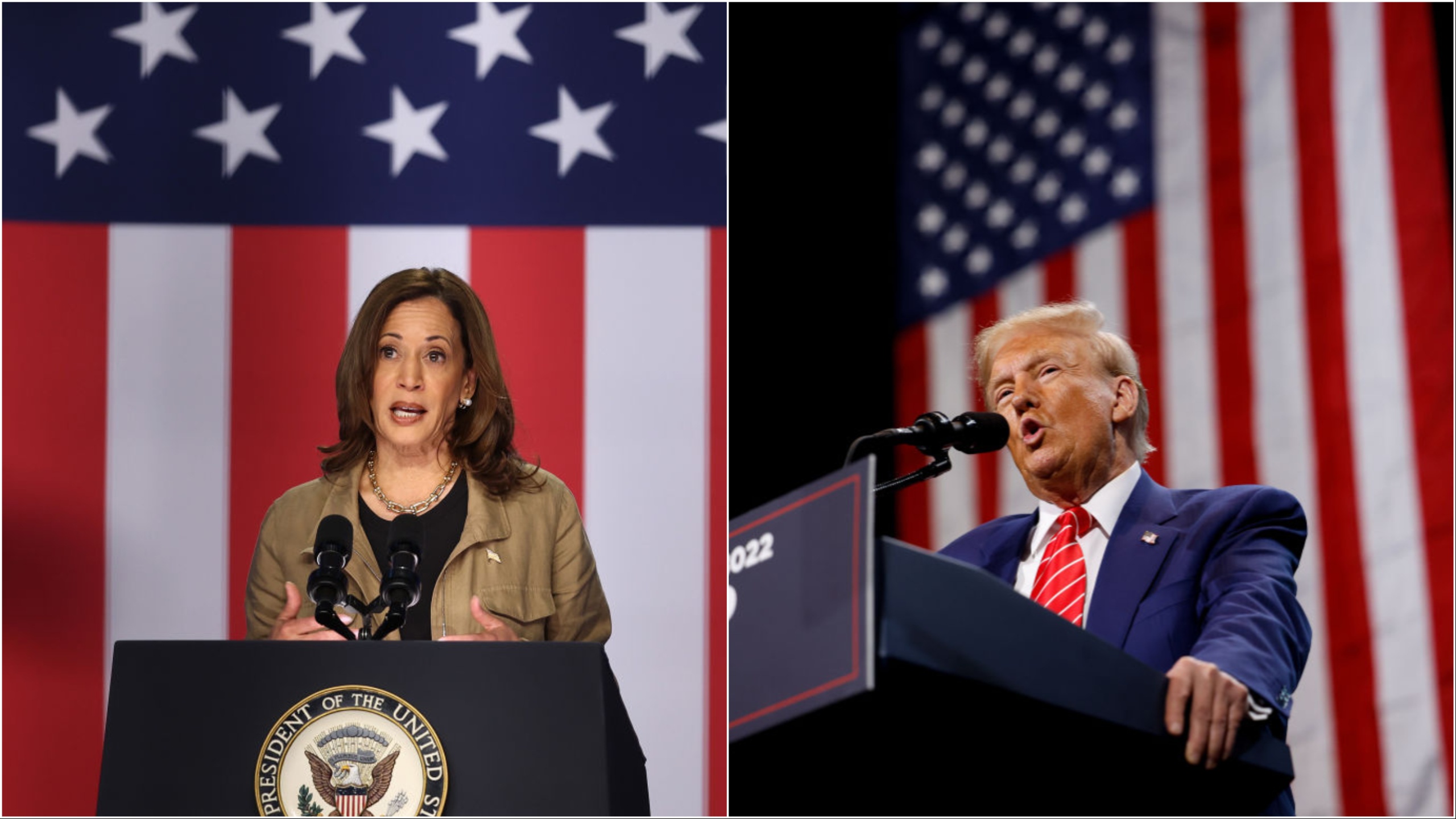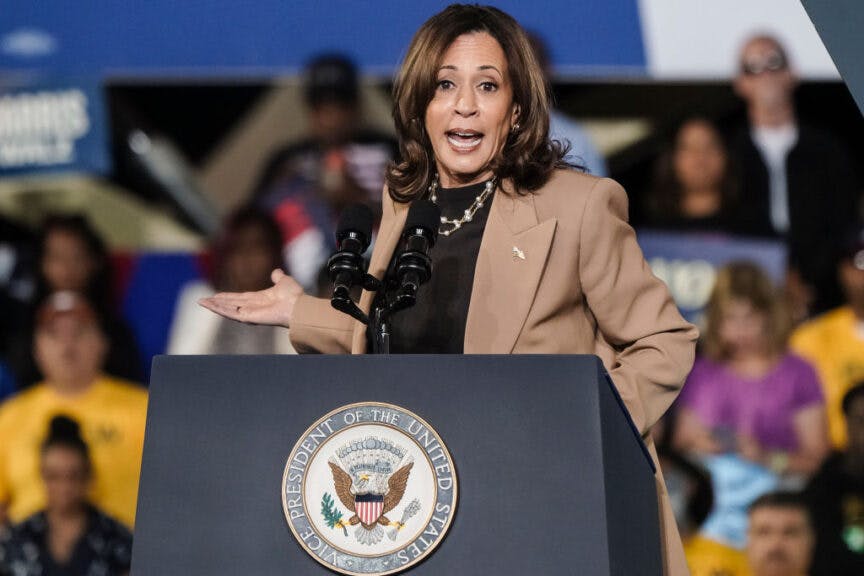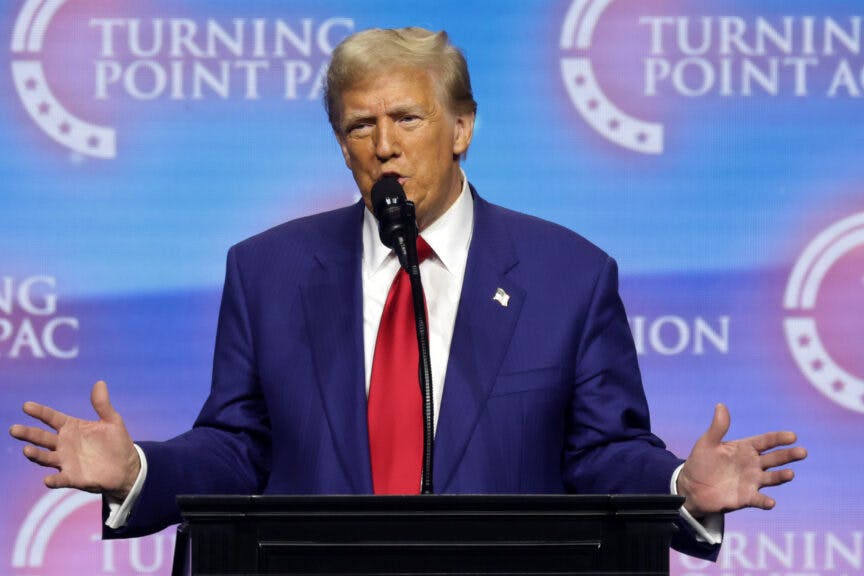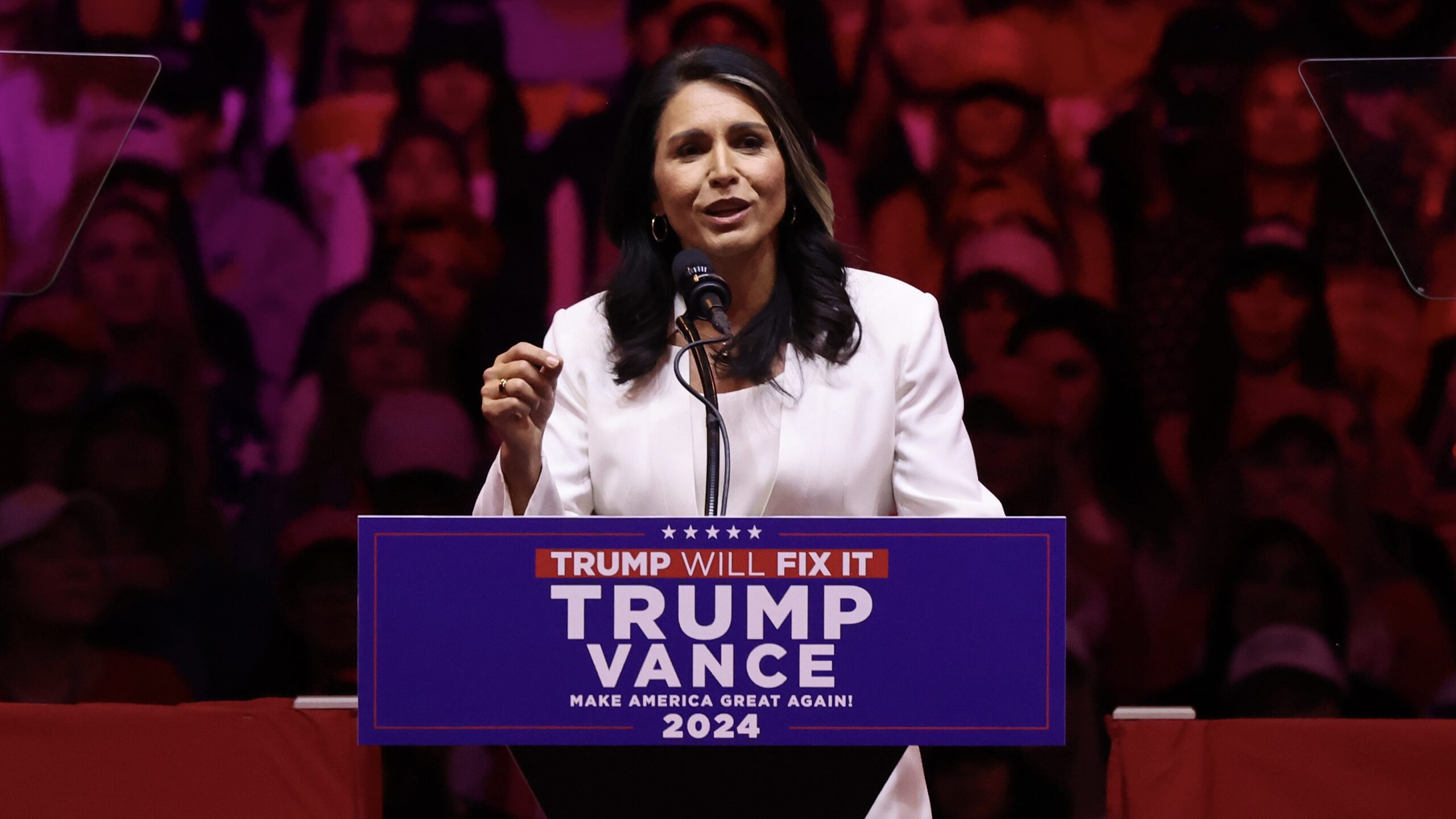Race To The Middle: Which Candidate Resonates More With Middle America?
The following is an edited transcript of an interview between Daily Wire Editor-in-Chief John Bickley and Newsweek’s Deputy Opinion Editor Batya Ungar-Sargon on the state of the U.S. Presidential race on a special Saturday edition of Morning Wire. In the final run-up to election day, the two presidential candidates are sharpening their pitch to voters. ...

The following is an edited transcript of an interview between Daily Wire Editor-in-Chief John Bickley and Newsweek’s Deputy Opinion Editor Batya Ungar-Sargon on the state of the U.S. Presidential race on a special Saturday edition of Morning Wire.
In the final run-up to election day, the two presidential candidates are sharpening their pitch to voters. Donald Trump remains focused on the economy and immigration, while Kamala Harris seems to be shifting back to the Democrat message of Trump being a “danger to democracy.” But whose vision for the country resonates with more Americans? In this episode we speak with Batya Ungar-Sargon, deputy opinion editor at Newsweek about the stark contrasts between Trump and Harris.
* * *
JOHN: Joining us to discuss the current state of the presidential race, including the gender and class divide, is Batya Ungar-Sargon, author of “Second Class: How the Elites Betrayed America’s Working Men and Women.” Batya, great to have you back on.
BATYA: Thank you so much for having me. It’s always such a pleasure and an honor to be with you.
JOHN: Well, we love hearing that and having you on. First, we’ve seen a new article from The Atlantic that the legacy media has given a lot of weight to. It levels some ugly claims against Trump about supposedly praising Hitler’s generals and disparaging a slain soldier – it’s based on unnamed sources. Everyone on the record, however, has said it’s nonsense. What are we to make of this story and how the legacy media are approaching it just days out from the election?
BATYA: It’s amazing, right? We’re right back where we started, “Trump is Hitler.” They just can’t keep away from it. And when they first trotted Kamala Harris out in what was nothing short of a coup against President Biden, replacing him with her at the top of the ticket, I think they thought she was going to emerge as some sort of phoenix from the ashes of the Democratic Party – as if we had never met Kamala Harris before, as if we didn’t know who she was. They really acted like this was a person no one had ever met. I think they believed that she was going to invigorate the base so powerfully that they could retire the “Trump is Hitler; Trump is a fascist; Trump is a threat to democracy.” Now that they are seeing she is actually just the Kamala Harris that we all know from her forays into politics over the last two decades, they’ve fallen back on what they think is their winning argument, which is “Trump is Hitler,” — which they had sort of promised to do away with, I think, in the wake of the first assassination attempt on his life. It really does smack of desperation, the fact that these are all unnamed sources; the fact that the allegations are exactly the same. The Atlantic had an article a couple weeks ago arguing Trump is Hitler, Mussolini, and Stalin, right? They’re trying to up the ante. And, of course, it’s so depressing because what it does is cheapen the impact Hitler actually had in this world. It cheapens who these people were, Mussolini and Stalin, by comparing them to somebody who’s, at the end of the day, a patriot and somebody who just wants the best for his country. I think we’re really seeing, both on the Left and on the Right, an inability to comprehend why Hitler was that bad. That’s really what we’ve gotten to. It’s not just that it engenders attempts on Donald Trump’s life, but it also really cheapens the history that a lot of people really suffered through.

Elijah Nouvelage/Bloomberg via Getty Images
JOHN: Meanwhile, we have Trump on the campaign trail serving fries to Americans and looking like a very relatable, non-threatening man who’s having a great time on the campaign trail. A lot of times you can see who’s winning by who’s having the most fun, right? Look, we keep hearing about the gender gap – you mentioned the identity question: “Women for Harris, men for Trump.” And a lot of polling does show this to be true. What do you see as the motivations behind that?
BATYA: It’s interesting, because what we’re really seeing here is the class divide mapping onto the gender divide. Harris is appealing to college educated women and Donald Trump is appealing to working class men. Of course, this has a lot to do with the aesthetics of the campaign. You mentioned Trump at McDonald’s and what I found so amazing about that moment was he showed up in his suit and did not take off his tie. He put the McDonald’s apron over the costume of Donald Trump. I think what that really showed was that he did not think this was a degraded job. He did not think that you had to sort of dress down and be humiliated to take this job. He acted the part of a McDonald’s worker with a lot of dignity. And I think that is why people really responded to that image of him. He looked proud to be doing it. He looked happy to be doing it. And I really cannot think of another politician who could have pulled that off in that way. He stands with workers and you see the way in which his economic policy is designed for the working class: No tax on tips, no tax on overtime, no tax on social security. He promised he would reduce the corporate taxes of any company that reshores manufacturing from 21% to 15%. This is going to encourage radical reshoring of manufacturing. He said he’s going to appoint a czar to entice American businesses back to the United States. Of course, women work in factories. Of course, women do service industry jobs. Of course, women work jobs that have overtime. But they are jobs that require physical brawn and physicality, the kinds of jobs that used to deliver the American dream before the Democrats became the party of the college educated. Meanwhile you look at the Harris campaign and she really is targeting that female college educated sector of the population — people who have less economic insecurity, less economic struggle. People who are very, very invested in the question of abortion, honestly, to an extent that does not represent where the vast majority of Americans are at, the middle and the working class, who have a much more moderate view on abortion. This idea that abortion should be legal in all cases is very correlated with whether or not you have a college degree, and of course, women today in America are 15 points more likely to have that college degree. So it really reflects the way the Democrats have created an economy that really rewards women in a very big way.

Win McNamee/Getty Images
JOHN: Now, we’ve seen millions of dollars from the Harris campaign funneled into abortion-focused advertising. Do you think that’s having a positive effect for her campaign?
BATYA: I think the elites care more about cultural issues and the working class cares more about economic issues at this point. The elites have more money and more time and more commitment as a result of that privilege to showing up and voting. So it was a very smart thing for her to do. Even though Donald Trump has promised that he would veto a national abortion ban, the Democrats are a much more natural party for people who believe in late-term abortions because Democratic politicians are unwilling to say what the upper limit on the right to an abortion should be. They refuse to give that. So even though it is Republicans whose view at this point, namely Donald Trump, reflects more where the American people are at because of this question of the bans that she has been able to, I think, successfully tar Republicans with, she’s really been able to mobilize that elite, over-credentialed, educated female vote.
JOHN: Now, you mentioned the economic policies of Trump. Harris has presented some of her own policy proposals. Can you walk us through the differences there?
BATYA: Absolutely. About one month in, she came out with an economic agenda she’s been calling an “opportunity economy.” And she had three main promises. The first was a massive investment in small businesses by way of tax cuts. People have sort of poked holes in that and said, “Well, a tax cut for a new business is not really going to help those people because they’re not going to have a lot of revenue those first few years,” which means that a tax cut is not going to help them very much. The second plank, she promised a $25,000 tax cut for first time homeowners, as well as cutting a lot of regulation around housing. And I think that that was actually a very smart plan from the cutting deregulation point of view, because, of course, we need much more housing. The reason people are finding it so hard to buy a home is just a sheer lack of supply. The problem with giving a $25,000 tax cut to first time homeowners is that it will increase demand. So there’s a real problem there. The experts on housing have said this is actually only going to make the problem worse because when you’re doing that you’re actually making more people able to buy homes, which means that this dwindling stock is going to become even more expensive. And the third idea that she had was just cribbed right from JD Vance, and it was a $6,000 tax cut for children for the first year of a child’s life. Of course, JD has said $5,000 and I believe it is unlimited for parents. So it was very interesting to me because from one point of view, this is not a great plan. It does reflect the Democrats overall view of how to help people who are struggling, which is instead of creating an economy that pays better to working class people, you sort of raise taxes on the rich and then redistribute that, which, of course, working class people don’t want that. They don’t want somebody else’s tax cuts. They don’t want welfare. They want much more of what Trump is offering, which is a protectionist economy, an economy that looks at the economy as a whole and says, ”How can we protect the labor of workers?” And Trump, of course, does that through tariffs, through, getting rid of free trade and then of course, through limiting the supply of labor through immigration control.

Alex Wong/Getty Images
JOHN: Speaking of immigration, I wanted to ask you about that next. There’s a stark difference between these two candidates on this – and this issue converges with the economy instantly. We’ve seen this playing out in all kinds of very specific ways – including with the Haitian migrants in some of these small towns that’s been highlighted in the debates. How is Harris trying to counter the immigration message? Is she doing an effective job at all?
BATYA: I think she’s sort of thrown up her hands on it, honestly. She was sort of caught between a rock and a hard place because she was second in command in the Biden administration, which has been an absolute disaster for immigration. Opening the border and effectively allowing in 10 million undocumented immigrants to compete with Americans at the bottom end of the wage spectrum. And what’s actually worse is when they finally, finally — after three and a half years — decided to take executive action, what they did was create legal pathways to parole a whole bunch of people. So you don’t have the mess at the border anymore. They have actually paroled hundreds and hundreds of thousands of people into the country to compete legally with American workers. And of course, that is why this is happening. The gains that working class Americans had been seeing throughout the Trump presidency, and then in the post pandemic labor crunch, were halted immediately. And there’s just been precipitous wage losses now — wage theft, to be honest, from working class people because of all of these paroled people. So the Haitians in Springfield are part of that group. They were paroled into the country by the Biden administration, I believe, because he thought that halting working class wage growth was the only way to tamp inflation down and to get that stigma off of his administration. So when Trump shows up and says, “They’re eating the cats, they’re eating the dogs, they’re eating the pets of the people in Springfield,” they’re probably not eating their cats and their dogs. They’re not doing anything to the pets. What they’re doing is they’re taking the jobs. And to me, personally, that’s much more outrageous than eating the pets.
JOHN: A lot of folks would agree. Now, final question: Energy was a focus for Trump in 2016 when he won. It’s a focus again now. Can you lay out the contrasts between these two candidates when it comes to energy policies?
BATYA: It’s interesting. That’s Trump’s answer when people ask him, “How are you going to get inflation down?” And he says, I think accurately, “Energy is one of the biggest drivers of inflation.” Because, of course, there’s energy at stake in everything to do with groceries, everything to do with food, whether it’s growing it, transporting it, feeding cattle — everything. The cost of energy is going to be a huge driver in the cost of everything else. Trump wants to “drill baby drill.” He wants to use every method available. He wants us to be energy independent, which of course is a huge, huge contributor to the sovereignty of our nation. Kamala Harris was, at one time, a very big Green New Deal extremist, but like immigration, she sort of tried very hard not to talk about this topic because even the voters in her party are no longer there. Everybody wants to get back to this sort of very moderate center. So she has not been able to express where she stands on this issue, like many other issues, because in order to win now, she has to pivot far, far away from commitments she’s made in the past. I think this is why they call Trump “Hitler” day in and day out, because it is Trump who has the moderate middle position on every issue. You look at where Trump is at, whether it’s abortion, whether it’s unions, whether it’s courting black voters, whether it’s energy, whether it’s immigration, even mass deportations – every one of these positions where Trump has eked himself out, that is where 50, 60, 70% of Americans are at, and that is the real threat to the Democratic Party.
JOHN: Batya, great to have you on again.
BATYA: Thank you so much.
JOHN: That was Batya Ungar-Sargon, author of “Second Class” – and this has been a Saturday edition of Morning Wire.
***
Originally Published at Daily Wire, World Net Daily, or The Blaze
What's Your Reaction?

































































































